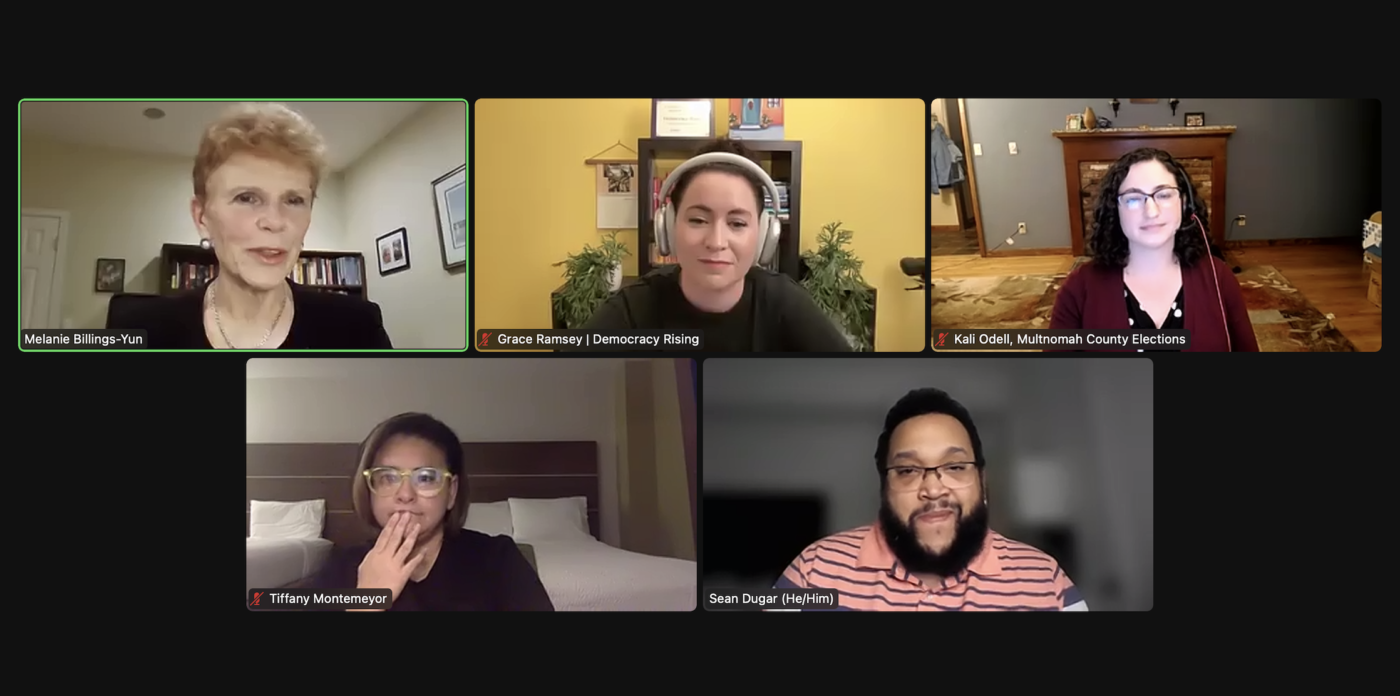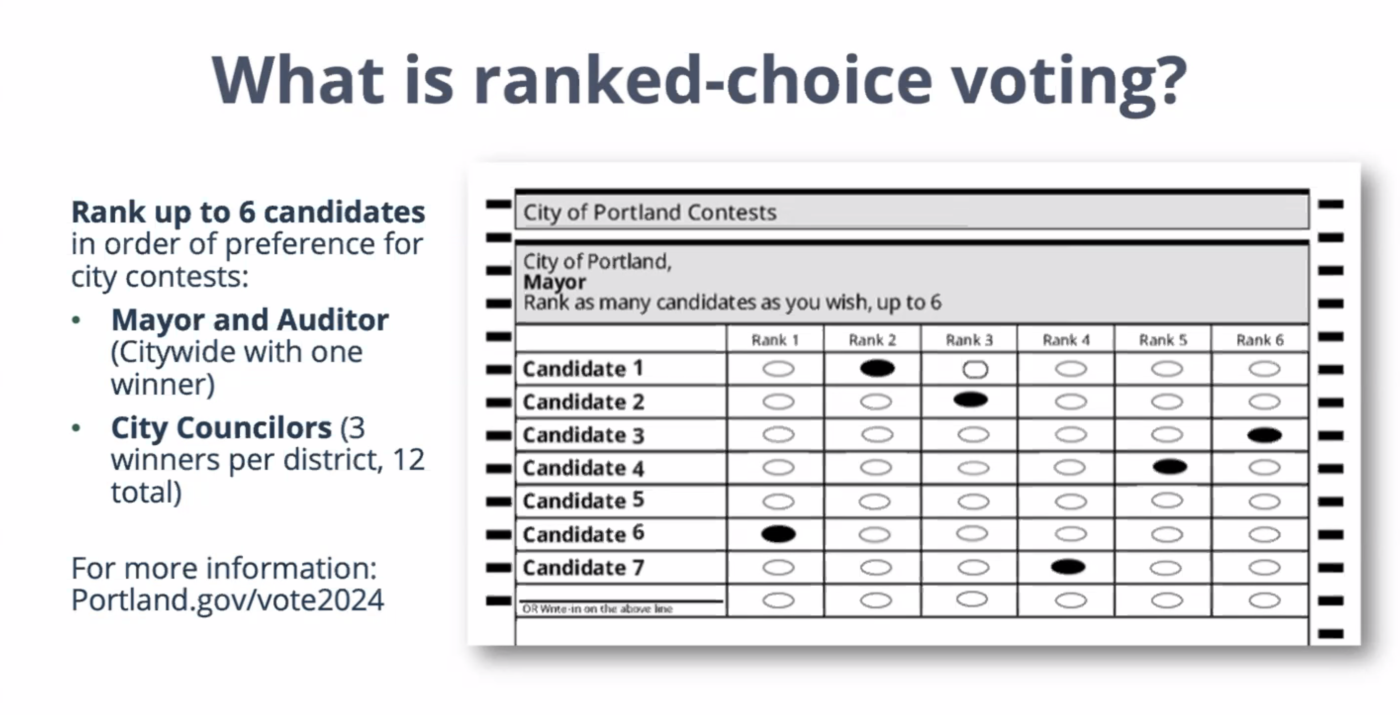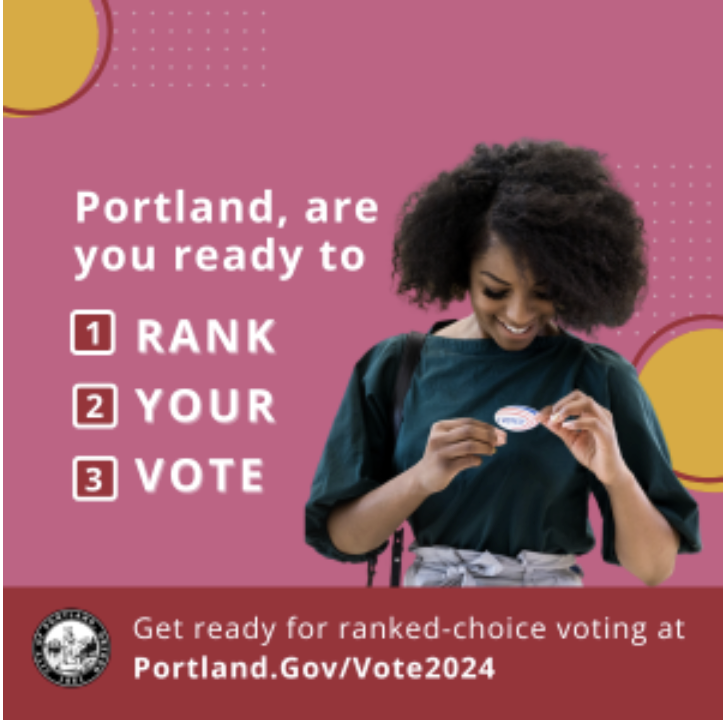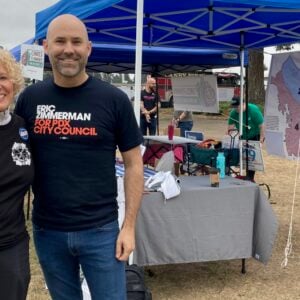
“You all have this!”
Those reassuring words came from Sean Dugar, a panelist at a recent League of Women Voters of Portland community education webinar titled, “Ranked-Choice Voting: Moving Portland Forward with Confidence.”
The League invited four national and local voting experts to share their experiences educating voters about ranked-choice voting (RCV). One of them was Kali Odell, an elections specialist with the Multnomah County Elections Division. I learned a lot from her about how Portland’s November election will unfold. For example, because we vote by mail, and because ballots postmarked as late as election day are accepted, it takes several days for all our ballots to arrive. How does that work with transferring votes and eliminating candidates? Isn’t there a chance that some candidates will be eliminated only to have a bundle of later votes boost their score? How can updated results be posted?
I learned from listening to Odell that the Elections Division will re-run the ranked-choice tabulation afresh, every day, on all ballots received to-date. In other words, they aren’t jiggering new arrivals into an old calculation, rather they recalculate from the start, and each day’s update reflects the rankings from the ballots on-hand.
But I’m getting ahead of myself. What I’m hoping to do by the end of this two-part post is to convince you that Dugar is right, Portland has got this.
Today’s post covers everything up to now — our large field of candidates, single vote transfer, why Portland is using multi-member districts, and the outreach blitz. Later in the week, my second post will get more technical — exhausted ballots, “last one standing” failsafes, and why you should “go for it” with the ranking.
Portland voters are a little skittish
In District 4, at least, I think when our candidate pool surged from a manageable 18, to an overwhelming 30 candidates, people started getting nervous.
And I’ve got to admit, as bullish as I’ve been about RCV, with 30 candidates even I started to imagine scenarios in which the count might get hung up and not return three winning candidates — particularly if voters became dazzled by the sheer number of people running, or if too many voters did not rank enough candidates to arrive at three winners.
So I set out this week to reassure myself and ended up with this post, a Voter Care Package which hopefully has something to reassure everyone.
Where are we: a recap
If you haven’t been paying close attention this past few years, here are two videos which will bring you up to speed about our new voting format in roughly 11 minutes. Even if you are already up-to-speed and know all about RCV in multi-member districts, watch them anyway, they are entertaining, funny and excellent.
The Oregonian explains single transferable vote using doughnuts. As my friend said to me, “I didn’t understand anything until watching this!” (4 minutes, 53 seconds to enlightenment.)
And if you are wondering why it is we need this newfangled system, (4 districts, 3 members each, council of 12; or 4-3-12) Mont Chris Hubbard tells you why in this classic video he made a couple of years ago (using M&Ms).
If you want to know more, maybe from an official source, check out the Multnomah County RCV website. They’ve got practice ballots and other materials. After all that, you will know more than you need to for voting.
But if the sweets are still leaving you hungry, and you are comfortable with statistics, lets go for the meat.
You prefer meat to sweets
The Mathematical Geometry and Gerrymandering Group (MGGG) of Tufts University is a nationally-acclaimed voting research group. They analyzed Portland demographics and modeled several voting and representation schemes to arrive at this 4-3-12 system, and concluded that this method has the best chance of offering the greatest number of Portlanders a voice. It was the MGGG work which informed the Charter Commission’s decision to use ranked-choice voting in multi-member districts (a form of proportional voting).
To better understand what this system means for Portlanders (without having to slog through all the statistics) turn to Kristin Eberhard, writing for The Sightline Institute: Want to Give Portlanders of Color a Voice on City Council? Districts Won’t Help.
Eberhard makes a point about minority representation that is lost on most people writing about our election:
The modeling was about people of color, but the results apply to Portlanders who are in the minority for any number of reasons: small business owners, people who are dependent on transit, those who get around by bike, youth, or parents of school-age children. Most groups don’t all live in just one part of the city, so districts might not help them have a voice, but proportional voting would.
Charter Commission members and advocates who care about better representation on city council—whether for Portlanders of color, or for any other class of under-represented Portlanders—would do well to look to multi-winner races and proportional voting, not single-winner districts.
OK, I get it, but what about everybody else?
Starting now, we are about to be on the receiving end of the biggest outreach blitz we have ever experienced, and that’s saying something in Portland. Voter education is considered part of the RCV implementation process. As I write, in fact, I just received the September newsletter from the City of Portland Transition Team, full of news and seven upcoming events.
And have you noticed the RCV ads that are appearing on BikePortland? Yep, they’re coming for you on your favorite news site (maybe this post even has one). Grace Ramsey, of Democracy Rising, told the LWV audience that,
We want to make sure everyone is coming along, and knows what is going to happen on their ballot. The goal that we have collectively is [that] as few people as possible are surprised on election day to see that ranked choice ballot.
She talked about media, radio, door-knocking, and said they are thinking creatively about “how we can reach people where they are.”
Conclusion
That’s enough for now. You should now know how to fill out your ballot, why we are using proportional RCV, and some of the statistics supporting Portland’s choice of this system. Later this week I’ll do a Part II to this post where I get more technical.









Thanks for reading.
BikePortland has served this community with independent community journalism since 2005. We rely on subscriptions from readers like you to survive. Your financial support is vital in keeping this valuable resource alive and well.
Please subscribe today to strengthen and expand our work.
How are they going to process the small part of PDX in Clackamas County and the small part in Washington County?
You know Jakob, I’ve got an old programmer’s habit of sorting problems into “solvable” or “problematic.” The city oozing into other counties falls into the “solvable” category, so I assume someone has competently dealt with it. Now, if I lived in one of those areas, I’d probably want to know more, as it is, I’m not sweating it. Too easy to lose the forest for the trees.
This is a perfectly good answer, but aren’t you just a bit curious?
People who live outside of cities get many benefit and fewer costs, relatively speaking, to those that live in the city.
this includes Portland roads, possibly water, possibly sewer, etc. Their is certainly a relationship that manages this, but I imagine if they live in a different county, they might not vote in a city election, or maybe they get to vote for Mayor/Council in Portland and also for Clackamas county commissioners while we vote for Multnomah county commissioners…
I suppose one could look here:
https://www.portland.gov/elections/elections-faq/general-voting-questions
or here:
https://www.clackamas.us/taxonomy/term/361
Don’t get me started on people that live in Vancouver, WA and come to Portland to work and shop and recreate…
As a physics person I am not allowed that luxury.
What am I missing in this question? Everyone should get a ballot applicable to their particular address, just like always, right?
I don’t see how county of residence would matter.
The district maps show that a small portion of District 1 is in Clackamas County, and small parts of District 4 are in Clackamas and Washington counties.
I assume nothing is different for those people. They used to vote for city commissioners, they still do.
My question was about processing, which is done by county. That is, how will the two outlier counties participate in the complicated and repeated calculations of distributing votes?
As a theorist of physics I have spent years calculating subtle and obtuse effects of waves in concert halls. Richard Feynman formally bailed on that kind of problem; had I known that I’d never have begun.
Let me know when you figure out the behavior of ephemeral elements in the Szilard-Wigner distribution.
My old neighborhood was annexed by Portland back in the 1980s. I wonder if anyone living there wishes they could “un-annex” now?
I am also keenly interested in this question. Jakob is correct:
Oregon law dictates that votes be counted in their respective counties. Thing is, ranked-choice is not “precinct summable”, meaning you have to centralize all ballots – you cannot figure out a round of elimination without all ballots in hand. In other words, ranked-choice is not actually a legal voting method for Portland (the charter commission was told this, repeatedly).
I’m wondering if this is just going to be one of those laws that’s ignored until a lawsuit happens, assuming the county clerks of Clackamas and Washington counties agree to send their ballots over to Multnomah. Or maybe those votes will just get handwaived away/disappear into the void.
Should’ve been STAR. STAR does not have this problem. Nor will it have all the upcoming-just-you-wait-shenanigans that result from pick-6-of-however-many+only-6-rounds-of-elimination. Things could end up being very messy depending on how votes land.
Lisa, you did a great job on this!
Thanks for this. But that is a lot to take in. Voting shouldn’t be this difficult.
It shouldn’t require long form articles and webinars to explain how this all works.
Also if I am voting for my favorite candidate it worries me that I may be unintentionally helping my 4th or 5th pick win at the end of the day.
Honestly, I don’t think it really is as difficult as this makes it seem. Lisa likes to get wonky with it, and I appreciate that. But in practice if voters have heard of any of the candidates and of those people they have heard of, choose their favorites, the system should work. Even in the best case from before this new system, if there were three or four candidates, I have serious doubts that anybody actually knew anything about more than one or two of them. That’s one reason incumbents usually have an advantage. People may say “yeah but it’s easier to know about four candidates than 30”. True, but who honestly did? Who did any research into all the candidates for city council before (population wide I mean – not you, I know you’re different)?
Now, is that a good thing? I don’t think so – I wish people knew more about what they were choosing. But they just don’t, and I don’t think this makes it any worse. And I think the new way has some definite benefits.
But, the main point I’m trying to make, is I don’t think it is that difficult. You do not have to research all 30 candidates, you choose as many or as few as you know about and like. You maybe delve into more details about the few you know about to decide the order to rank them. I think all these edge cases people fear aren’t real enough to really make a difference in practice.
The one concern I do have about the new system is if there is a bias to reading a bit about the first two or three options on the ballot and choosing one of those, or just choosing the top N on the list. That could be bad, giving a huge advantage to last names that sort higher or whatever arbitrary sort order they use. They could solve that easily by randomizing the order on each ballot, but I don’t know if they have.
Before you had to know enough to pick one of two (in the general election, when most people vote). Now you need to
chooserank 6 from a list of 30.You can downplay it all you want, but that’s not just a variation on a theme — it’s fundamentally different and hugely more difficult (even if you have a list that someone else has prepared for you, which I think many people will).
“Hugely more difficult.”
That was the argument Mapps and Gonzalez made when they tried to gut the new system despite the fact voters clearly wanted it. It was paternalistic and arrogant and an insult to the intelligence of the electorate.
Define the increased difficulty in terms of extra minutes/hours and reading needed to fill out a ballot this time.
I’m calling hyperbole.
“A properly functioning democracy depends on a well-informed electorate.”
Thomas Jefferson
Most people are paralyzed by an overabundance of choice, and find ranking difficult. These are both well established facts about human cognition.
I don’t recall needing to participate in a webinar and permutating the mathematics of my second, third and fourth variables in order to select a single box on a now old fashioned ballot.
You might be thrilled and happy with the new system, but it seems a bit much to not acknowledge the difficulties and differences (as shown by Lisa’s article). The old technique was one checked box per position. This new one (that I am not participating in, I am just one of those ex-Portlanders who don’t want to let go) does seem a bit more complicated.
“Most people are paralyzed by an overabundance of choice…”
♂️
I acknowledge it’s different.
I acknowledge being an informed voter in regards to the city council race will take more effort than it used to.
The voters already decided it was worth it.
Again, ranked choice voting was not imposed upon us by Bureaucratic Overlords. Our fellow citizens voted for it.
I remain among the unparalyzed.
Nonsense. Voters decided to try it. No one yet knows if the governmental overhaul we voted for will be worth its considerable expense.
We can talk about that in about 5 years.
Well, that’s how every vote works, right?
Democracy, sheesh. What a mess.
Yes, that’s how every election works. I was just pointing out that your characterization of the election results was premature.
There are many reforms we’ve enthusiastically passed by referendum that we’ve come to regret. It’s far too soon to know if this will be one of them.
You still had the primary election before, which if you decided not to vote in, you were effectively choosing from a list that someone else prepared for you in the general.
The previous system was just as garbage if you skipped the primary, and not any different if you didn’t skip the primary. If you skipped the primary you were just saying “let whatever special interests and money that are out there present me with a false dichotomy so I can pretend voting is easier”.
For better or worse, only a minority voted in the primaries. I would consider those people to be (generally) high information, motivated voters. Even they would have difficulty absorbing 30 candidates, never mind ranking them.
I think we would have been well served to have a primary (by RCV) to winnow the pool to 6 candidates that would square off in the general election (also by RCV).
Maybe that’s a good idea. Maybe not, it’s hard to say. The previous primary could still have just as many candidates, couldn’t it? There wasn’t some arbitrary cap on how many people could run. So we were vulnerable to 30 people running before.
The previous system depended on some “well-informed” (people with time on their hands, probably not actually a representative sample) group to decide up front what our options were, giving people a (probably biased) false choice of candidates. Now instead, the candidates need to make an impression on their actual voters.
If the people who didn’t vote in primaries before either don’t rank people now or their votes amount random to noise, then we still have the same “well-informed” group making the decisions.
Although it does take away the illusion of choice some people had when their options were artificially winnowed down by a primary process they didn’t partake in.
Absolutely. It could have had hundreds. It just never did.
We’ll see how it goes. Maybe people will love voting this way.
Agreed. And for what it’s worth, the voting system has nothing to do with the number of mayoral candidates. That’s more the donation matching stuff, and the whole entire point of that was to get more candidates.
The mayoral race is relatively simple; you have two clear frontrunners (incumbents with name recognition), and then some other folks who may get an inconsequential boost by folks ranking them before their “serious” choice.
I don’t think there’s been much change there, and I think the outcome will be approximately the same as it would have been under the previous system.
I deliberately wrote the article from easy to hard. You can stop reading at the Oregonian doughnut video and know more than is needed for voting. In fact, the first graphic of the sample ballot is probably all you need.
That’s what I’m saying, that’s my point. You don’t need to know all the details. They’re fun to learn about for those who are interested, and if you care enough to have concerns, these details should inform you. But in practice, to vote, it’s really not confusing.
It’s waaaayyyyyy too many candidates.
You’re not required to rank anyone who you don’t want to “help win”. If you don’t have a 4th or 5th pick, then just pick your top 3 and leave it at that.
The complex explanation is mostly to address (very valid and healthy) questions about ways it could theoretically break, but the actual process is super simple:
When it comes time to vote, that’s all there is to it.
Jay Cee, one set of facts which were mentioned in the webinar is that 85% of RCV voters found voting that way understandable, and 99.9% of voters cast a valid ballot. I don’t remember which city those stats came from, but RCV has been studied to death. There are a lot of empirical studies.
If you think 1,000 words is long-form, I’ve got some old Harpers and New Yorkers for you 🙂
The intuition that voting shouldn’t be difficult is appealing but it’s just wrong. Voting theory is a complex, difficult, and highly specialized academic discipline. Every voting system is a trade off between a lot of different criteria. The previous system used for city elections was much simpler than this one. It was also a system where voters had to be strategic; in many cases, voting for one’s honest first choice would throw the election to the candidate least aligned with their preferences. You saw people bewailing this all the time, or getting in flame wars over whether or not it was acceptable to “vote your conscience.” The new system is less prone to this problem (it’s called the “spoiler effect” in voting theory jargon), at the cost of higher complexity. Now, I personally think that there are other voting systems that represent a more optimal tradeoff between maximizing voter honesty and minimizing the complexity of the system, but you can’t just wish away the tradeoff.
Lisa,
You seem to have drunk the Kool-Aid. I’m curious if you and others will be quite so bullish in a few years., especially on the multimember RCV with STV that we’re using for City Council elections. We have had a lot of failed local and state government experiments recently. My prediction is that this new voting scheme will be another.
Oh, by all means let’s keep the perfectly functional system we currently have.
Do you actually live in Portland?
Damn, give me credit for doing my tiny part in making the Kool-Aid! Everything about the charter reform process has been open, transparent and public. There was nothing top-down or imposed-on-the-public about it. In fact, Mapps and Dan Ryan did all they could to stop it.
The opaque decision by the Charter commission to ignore the recommendation of their electoral system subcommittee and select STV (with little public process) was not particularly transparent or open.
https://www.equal.vote/q_and_a_pdx_charter_commission
The decision of multiple members of the Charter committee to run in the first election also tainted this decision. How is it ethical to vote on an electoral system when you yourself might benefit from your vote?
Such a missed opportunity.
Wow Lisa , you must have been really thirsty when that Kool-Aid was passed around. 🙂
The Charter commission was comprised of unelected, non-diverse members from which 2 resigned in protest over the shenanigans they pulled. They suffered from groupthink and seemed much more interested promoting their form of “racial justice” than improving our governance structure. Not surprising they created such confusion and a poor work product. Regardless we’re stuck with it for now.
(The one good thing was removing City Council members as Bureau heads)
https://pamplinmedia.com/pt/553917-443264
They were hand-selected by our elected city-council members. And one of the two who resigned in protest was Vadim Mozyrsky. Don’t have bandwidth to go mano-a-mano w you, but the MGGG work is solid. As this was all playing out (and we are re-litigating old battles from before 26-228 passed) my biggest disappointment was that opponents, most prominently Mingus Mapps and Vadim Mozyrsky, could never engage in a serious discussion about merits or pitfalls. It was hand-waving, deliberate misrepresentation, and hyperbole. They could never pull together a serious critique.
The charter committee didn’t impose the new system on Portland. They created an evidence based model of recommendation. The voters of Portland had every opportunity to reject the recommendation – there were certainly credible, experienced leaders who suggested they do so. But the voters of Portland decided to go with it.
You can spin your discontent however you like.
And “resigned in protest “ is often code for “ I’m not getting my way. I’m taking my toys and leaving.”
At least one person who resigned had strong motivation to maintain the status quo.
So Lisa, correct me if I’m wrong (and I’m using what I’ve learned from elections in the Republic of Ireland which uses more or less the exact same system).
First, to get to the 25%+1 threshold, all the ballots need to come in already, and given Oregon’s vote-by-mail system, this could take up to two weeks after November 5th? Presumably the city will have an exact number of registered voters in each district (and an estimate of possible provisional ballots of not-yet-registered new voters), so given the usual turn-out of say 60%, they can at least guesstimate what that 25%+1 figure is likely to be close to even within a few days, but might it still may be after November 12th before we get any results?
Second, depending on how each district has historically voted (e.g., East Portland is historically more conservative, inner SE more liberal), and given the large pools of candidates in each district (19 to 30), how soon will we see candidates openly declaring themselves associated with partisan political groups and/or associations, or vying for particular endorsements (Street Trust, PBA, Teacher’s Union)? (I note in the Irish elections, right-wing voters vote for certain lists of similar parties or independent candidates, similarly to those on the far left, and those in the center 2 parties vote for each other’s candidates as 3rd or 4th ranked votes.)
Third, what role, if any, will the 95 registered neighborhood associations play in the new districts and the elections? (Note: District 1 is the entirety of the 13 East Portland NAs in EPCO/EPAP plus Sumner in Cully.)
Regarding your third and fourth paragraphs, all that is already happening. The mayoral candidates have endorsed city council candidates, so there are broad, informal groups of candidates who want to coalesce. The usual groups have made endorsements.
Neighborhood associations are not allowed to favor or endorse candidates, if they invite one to speak they have to invite all of them. Most don’t have the capacity for that. But larger groups, like Oregon Walks, have teamed with other neighborhood groups (like SWTrails) to host walk-arounds and meet and greets. There is a lot going on and folks are more engaged than I’ve ever seen. I’m hosting a candidate house party tomorrow night. It’s exciting, but probably hard on the candidates.
As long as they’re dedicated to counting it accurately: Yes.
This systems seems overly complex and I still don’t think many people (including many who profress they do) undertand how the votes will be counted in the multimember council races. My understanding is that this multimemeber RCV system is not used anywhere else in the USA.Regardless, it seems very opaque and it’s pretty clear most voters won’t understand how their vote is counted (or not). I don’t think this is a postive despite the efforts by many to cast it as an improvement. Time will tell at this point.
Minneapolis uses it.
Minneapolis uses it for the low-stakes offices of At-Large Board of Estimate and Taxation and At-Large Park Board Commissioners, not for the races most people pay attention to like City Council or Mayor.
https://vote.minneapolismn.gov/ranked-choice-voting/how-we-count-rcv-ballots/
Thank you. And it appears only ONE of those offices (At-Large Park Board Commissioners) has 3 members with a win coming at only 25% plus one vote
It’s also used widely in Maine in both federal and state elections and in some local elections (Portland.)
RCV is used in a lot of places, it’s the RCV in multi-member districts that is different, it is a method of proportional voting. Minneapolis, and Cambridge, MA (I think) use it, but at a smaller scale than what we are about to do.
STAR voting (both single and multi-candidate) would have provided a choice that is far less confusing and less prone to PR voting pathologies (see how Alaskans turned against PR RCV, as an example).
It’s a pity that certain members of the charter commission decided, at the very last minute, to throw out the hard work of their electoral system subcommittee and vote for a different system. Moreover, based on public comments of certain commission members who are currently running, it’s clear that this decision was marred by the worst kind of conflict of interest.
I believe Maine only has traditional RCV, not the multimember version Jenni P referred to.
A couple additional thoughts:
I’m in district 3, but in the odd sliver north of Division and sandwiched east of 82nd but west of 205. My sympathies and background lean towards District 1, but I’ve got a great slate of candidates to choose from in 3, so I’m cool with it. I am glad that the black and brown and immigrant residents of The Numbers are pretty much guaranteed 25% representation on the City Council going forward. And we’re all guaranteed that the 3/4ths of Portland’s population that is east of the Willamette will be represented by 3/4ths of the city council. No, it’s not a guarantee of good council members per se, but it’s a better guarantee of representative local government that’s not weighted towards white men and downtown business interests than Portland has ever had.
And regarding the burden of sifting through all the candidates to come up with your 6, or 3, or whatever, my strategy is just to focus on those with proven government (or equivalent) experience that aligns with what I think Portland needs right now. Others may feel differently, but I don’t think working out the kinks in our new form of government is a job for rookies , however well intentioned.
Oh my, who in the world do you think is working out the “kinks”? Experienced professionals who are experts at this brand new to Portland system?? The people in the bureaucracy whose corruption or incompetence (take your pick, the end result always seems to be the same) gave rise to the need for a desperate change?
All I meant is that I’m more comfortable voting for people who have a solid record of collaborative problem solving, because the twelve new council members are going to have to work together to make this a success. Everyone knows it’s going to be messy. I’m going to vote for people I’m fairly confident can hit the ground running and keep their ego in check. There are council candidates with good track records. And others with uncomfortably thin résumé’s.
You’re good at slinging the negative. What’s your solution?
If you’re as hopeless about this change as you sound, why comment at all?
I actually like your first paragraph here. It acknowledges that “Everyone knows it’s going to be a mess” which is a far cry from most of the other posts here where you spend considerable time gaslighting people over their concerns over the process.
It is quite okay to have concerns about a brand new process with brand new political boundaries and brand new numbers of representatives and not be confident it is going to work out as expected.
I applied for a position late last year with the City and during the first interview I asked what the office situation would be. After a pause I was told they weren’t sure what the physical space would look like with the coming changes and now that I had brought it up would I be willing to be moved out of my hired position if that position was eliminated during the change over after the election? So my take away with that and subsequent news articles and reading BP was and is that the City government has little idea what is going on and they are winging it.
Also, you seem to equate negativity with honest concern that the people involved are acting out of self interest rather than enlightened interest. If the City’s elected and bureaucratic staff had acted with enlightened self interest over the past several decades if not longer, the cry for the change you are so eager to champion would not be necessary.
Of course I and many others are concerned, that doesn’t mean I don’t see the need for change.
Personally I would have simply made smaller districts with one person per district and not worried about rank choice voting. I agree with you that there did need to be more representation and it needed to be grounded to a geographic area.
I remain curious how the models that are being put forward will stack up against the actual results come election night, or however long it takes to count everything.
The Mont Chris Hubbard video I linked to in the post very clearly explains why a one-representative-per-smaller-district scheme does not work. Previous posts I’ve written show how it leads to a paralyzing NIMBYism.
Hubbard’s video is excellent and well-worth 6 minutes of your time:
https://www.instagram.com/montchris/reel/CkBwb3SDSQA/?locale=ko-KR&hl=en
Thank you for that Lisa! I did watch it and I don’t quite get how the smaller, single districts translate into NIMBYism if they happen to elect all “blues”. I better point out that I am not a fan of electing all “blues”, it just didn’t seem cut and dry that they would do that. Is it an underlying assumption that the “blues” will always be NIMBYs that I’m not familiar with?
I feel I should state for anyone else seeing this that I’m not trying to be difficult. I guess I hadn’t understood that one of the over riding goals of the Proportional Representation was to elect less “blues”.
There’s a greater probability of electing a non-blue if voters get to rank candidates. For example, I’m more likely to take a risk on my favorite mayoral candidate if I know I can hedge that vote w other candidates more likely to win.
Sure, but that wasn’t his question.
Why do smaller districts inherently lead to NIMBYism? And if they do, wouldn’t citywide at large elections be better yet?
https://bikeportland.org/2022/10/26/affordable-housing-advocates-endorse-portland-charter-reform-measure-366040
This just isn’t true.
It was the aldermanic one-rep-per-smaller-district that led to the very effective sewer socialism of the early twentieth century.
I also think it’s hilarious that you claim the French arrondisment system does not work after visiting Paris and being wowed by its transformational changes to the built environment.
Peut-être que le système d’arrondissement est une bonne solution, Lisa.
Aldermanic systems have a high potential for abuse. One needs only to look at Los Angeles or Chicago to see that. Better IMO to have multiple members from the jump and tamp down on that potential.
“Will the Last,” look at this post I wrote two years ago, it is about the relation between new housing, governance and voting, and NIMBYism. LA has 15 voting districts and a massive NIMBY problem. From my post:
“who in the world do you think is working out the “kinks””
Nobody yet, obviously.
But just in my district (3), the following candidates have solid government/non-profit track records that at the very least demonstrate competence at tackling the issues that will face the new city council.
Rex Burkholder
Jesse Cornett
Philippe Knab
Tiffany Lane
Angelita Morillo
Steve Novick
This isn’t an endorsement, and I’m not decided yet on who I’m voting for. But I’m confident there are candidates who are more than up for the challenge.
Reminds me of the old Dire Straits song Industrial Disease – “two men claim they are Jesus, one of them must be wrong” – at least 3 of the people you just listed cannot get elected.
That leaves three that can.
“Three, it’s a magic number.”
And don’t underestimate the power of name recognition in a field of 22 candidates vying for three slots.